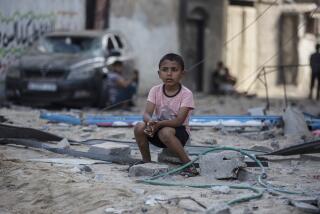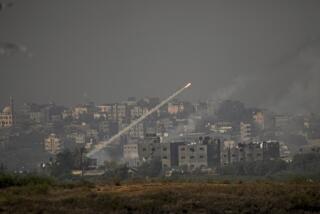Refugees flee Mideast’s perpetual ‘gang wars’
- Share via
I kicked off my 1999 book of political cartoons, “One Man Show,” with a satirical illustrated account of the previous thousand years, titled, “A Brief History of the Millennium.” In one passage, I wrote of those distant centuries:
“The world’s peasant majority lived at the whim of psychopathic killers and thieves. These unpleasant gangsters went by different names in different cultures: kings, princes, dukes, emperors, conquerors, caliphs, sultans, chiefs. Among them, there was Tamerlane in central Asia who loved to pile up the severed heads of his victims. There were the Aztec rulers who, on one particular day, cut out the hearts of 20,000 captives. And there was Mensa Musa, the African king, who executed anyone who dared to sneeze in his presence.”
From Genghis Khan to the medieval monarchs of Europe, most societies through most of that 1,000-year period were run on the mafia model — a ruthless gang of cutthroats would take over a particular region, set the rules for everybody else and demand to be paid protection money on penalty of death. Eventually, some of the descendants of these criminals would become benign figureheads, like the Windsors in Britain. In a few places, a different model took hold where the common people had some amount of input into what laws were made and who governed over them. Tragically, though, for much of humanity, the old gangster system has continued right into the 21st century.
Nowhere is this more apparent than in the Middle East. Apart from the citizens of Israel, Turkey, Tunisia and, arguably, Jordan, the people living in the countries of that miserable section of the planet are forced to buckle under to the rule of theocrats, ruling families and military strongmen or, alternatively, suffer amid the anarchic violence of terrorist gangs who have not yet achieved governmental power. The people of Syria are stuck with both. They are caught in a civil war between the nepotistic, dictatorial Assad regime and the horrific, fanatical rebels of the Islamic State.
No wonder, then, that tens of thousands of them are risking everything to get out of Syria and make their way west, hoping to share in the prosperity, freedom and stability of Europe. They are joined by refugees and economic migrants from Afghanistan, Iraq and parts of Africa where chaos and cruelty reign. Europeans are giving these desperate people a mixed welcome. Hungarians are putting up a fence and blocking them at railway stations; Germans are greeting them with food, shelter, work for adults and schools for children.
The human tragedy of the refugees tugs at the heartstrings, but one can also feel sympathy for the Europeans who are now forced to cope with a massive, costly problem that is not of their own creation. Yes, a century ago, Europeans did draw the arbitrary boundary lines that crisscross the modern map of the Middle East and they, along with the United States, have repeatedly injected themselves into the affairs of the region. Nevertheless, the full responsibility for the crisis in Syria cannot be laid on the West. Dictatorial rulers and fanatical terrorists have played the most direct role in Syria’s disintegration and, as is the case in power struggles throughout the region, the contesting sides have demonstrated an utter uninterest in moving beyond the mafia model of social organization.
The Arab Spring that dawned with such hope only a few years ago was quickly and violently beaten back by the forces of tribalism, authoritarianism and Islamic extremism. Now, with not a single hopeful sign in sight, a dark age is enveloping the region. While the rival gangs battle for supremacy, the only sure prediction is that the flood of refugees will grow.
More to Read
A cure for the common opinion
Get thought-provoking perspectives with our weekly newsletter.
You may occasionally receive promotional content from the Los Angeles Times.










